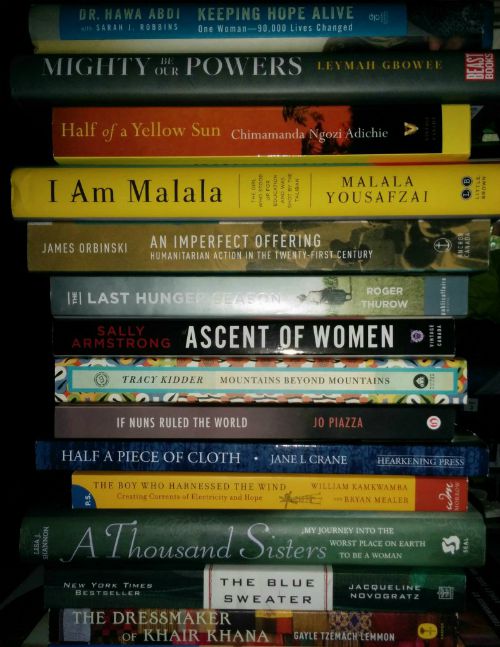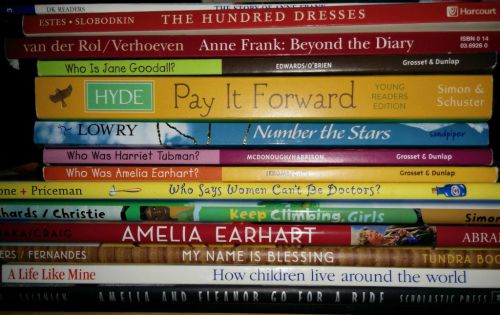
by Alison Fraser | Jul 7, 2015 | Advice, Africa, Canada, Childhood, Education, Family, Girls, Global Citizenship, Humanity, Poverty, Social Good, World Voice

I am an avid reader, especially during the summer months, reading outside each evening with my daughters under the stars on our back porch. I go back and forth between fiction and non-fiction, between heart-wrenching and laugh out loud funny, and between popular bestsellers and hidden gems. So, I thought I would share my meaningful reads list for this summer. These are most often the hidden gems that aren’t featured on lists of number one hits but are just as good, if not better, than those popular reads.
I won’t go into detail about plots and story-lines, but will say that each of these books was a page turner that left me pondering what I had read for weeks after.
If I had to pick a favourite, I would decline…it would be too difficult. But, if I had to pick one that resonated the most with me, it would be “If Nuns Ruled the World”.
Being a Catholic myself, I have always felt that nuns were never given the credit they deserved for the work they were doing throughout the world. We all know of Mother Theresa and her work with the sick, lonely and poor, but not much more is known of nuns working in this day and age. We often hear stories of the Pope and those of the Vatican, but what about those hard-working nuns who are on the ground changing lives every single day in the most adverse of conditions???
This book features the incredible stories of nuns who have taken chances, gone against protocol, helped those that others had given up on, and did it all under the watchful eye of many who disapproved of their work. These nuns are courageous, spunky, lively, funny and most of all, selfless and good-hearted.
I was so inspired by their stories that I wrote to a few of them to let them know….and they wrote me back!
I can honestly say that if the nuns who were featured in this book, really did rule the world, it would be a world of peace, justice, love, acceptance and empathy.
When my three young daughters saw me compiling this list, they too wanted to be involved. They hurried to find their favourite meaningful reads and have compiled them here as well:

Quynn, who is 8, loves the book “Who Says Women Can’t Be Doctors” and has wanted to become a doctor ever since.
Camryn, who is 10, loves the “Who is/was…” series. She has read about Jane Goodall, Hellen Keller, Eleanor Roosevelt, Harriet Tubman and Amelia Earhart, to name just a few. Wanting to be a pilot, she especially loves all books about Amelia Earhart.
Ryleigh, who is 11 loves to read about Anne Frank and anything related to the Holocaust. She read “Number the Stars” in two days and has not stopped talking about it. It is so hard for her to wrap her young mind around the stories of girls her age who survived such atrocities in our history.
So, if you are looking for some great books to read this summer, we hope that you will enjoy some of our recommendations. And, if you have suggestions for us, we would love to hear those as well!
What is on your summer reading list?
This is an original post written for World Moms Blog by Alison Fraser who is founder of the non-profit Mom2MomAfrica.
Alison Fraser is the mother of three young girls ranging in age from 5 to 9 years old. She lives with her family in Cambridge, Ontario, Canada. Alison works as an Environmental Toxicologist with a human environment consulting company and is an active member of the Society of Environmental Toxicology and Chemistry (SETAC). She is also the founder and director of the Canadian Not for Profit Organization, Mom2Mom Africa, which serves to fund the school fees of children and young women in rural Tanzania. Recently recognized and awarded a "Women of Waterloo Region" award, Alison is very involved in charitable events within her community including Christmas Toy and School Backpack Drives for the local foodbank.
More Posts - Website
Follow Me:



by Mannahattamamma (UAE) | Jul 2, 2015 | 2015, Childhood, Feminism, Global Citizenship, Government, Health, Human Rights, International, Motherhood, Newborn Health, Poverty, Save The Children, UAE, USA, World Motherhood

Save The Children
There are some causes that are tricky to rally people around: not everyone wants to ban fur coats, for instance; not everyone thinks that restaurants should post calorie counts on their menus. There are other causes, though, that seem pretty much no-brainers: access to clean water, for instance. Is anyone really going to say “yeah, dirty water, I’m a big fan!” Or saving children. Is anyone really going to say (publicly, anyway) that it’s not a good idea to save children?
Even if we all agree that children should be saved, however, we know that all over the world there are children who need saving, in places where governments and infrastructure don’t seem capable of doing what needs to be done. That’s where organizations like Save the Children step in: they help stitch together the services that can help families survive and give governments a much needed hand.
Save the Children came out with its annual “State of the World’s Mothers” list, which uses five metrics to determine where it’s good to be a mother (and a child). The metrics – maternal health, children’s well-being, educational status (of mothers), economic status, and political status— are combined to give an overall score, which determines where a country falls on the list. Of 179 countries, there are the usual suspects at the bottom of the list—countries where war, natural disasters, and poverty combine in a perfect storm of catastrophe: places like Haiti, or Sudan, or Pakistan.
But there are surprises, too, like the fact that the United States doesn’t even crack the top twenty. Nope, the good ol’ US of A pulls in at 33.
Thirty-third in the world, for a country whose overall wealth and education trumps pretty much everywhere else. The US was beaten by, among others, Slovenia, Belarus, Croatia, and the Czech Republic, as well as all those Scandinavian countries that consistently outperform everyone else when it comes to quality of life issues.
You know what most of these places have that the US does not? A significantly higher percentage of women in government. I suppose a statistician would say that fact is not causal but correlative, and I’m sure that some people would insist that just having women in government won’t automatically make things better for women and children (and thus society), but maybe we should try, and then see what happens?
I live at the moment in Abu Dhabi, in the United Arab Emirates, another wealthy country that doesn’t crack the top twenty on this list. I suppose that for many Westerners, it might seem impossible any Middle Eastern country would score well on a list having to do with women’s lives, but the statistics on this list might help defuse those stereotypes. According to this index, 17.5% of seats in UAE government organizations are held by women, compared to 19.5% in the US; in terms of lifetime risk of maternal death, it is better to be a woman in the UAE: 1 in 5800 versus 1 in 1800 in the US. Women in the US average about 16 years of schooling, women in the UAE about 13; and women in the US tend to be wealthier than women in the UAE (53K for the US, 38K for the UAE).
The Save the Children list doesn’t index maternity leave policy, but that offers another interesting point of comparison.
Women in the UAE only receive 45 days of maternity leave, which isn’t enough, obviously, as any woman who has given birth understands. Women in the US get twelve weeks of maternity leave (although I had to call it “disability” leave in order to ensure that I got the requisite number of days). Twelve weeks, that is, of unpaid leave. John Oliver brilliantly skewered this policy on Mother’s Day, pointing out that the United States aligns with Papua, New Guinea, as the only two countries in the world with no paid parental leave policy. In the UAE, if a woman has a medical certificate that attests to her need for more time at home, she can take up to 100 days of additional (unpaid) leave.
Organizations like Save the Children do invaluable, back-breaking work among desperate populations, but their work raises a question that those of us who live with more privilege should be asking–loudly–of ourselves and our communities: why aren’t we all tied for first place? What has to happen to force “resource-rich” countries take care of its most vulnerable citizens? Why aren’t we doing better?
Where does your country rank in this list? And how do you think your country can do better? Any thoughts?
This is an original post to World Moms Blog by Deborah Quinn in the United Arab Emirates of “Mannahattamamma.”
Photo credit to ‘Save The Children’.
After twenty-plus years in Manhattan, Deborah Quinn and her family moved to Abu Dhabi (in the United Arab Emirates), where she spends a great deal of time driving her sons back and forth to soccer practice. She writes about travel, politics, feminism, education, and the absurdities of living in a place where temperatures regularly go above 110F.
Deborah can also be found on her blog, Mannahattamamma.
More Posts
Follow Me:












